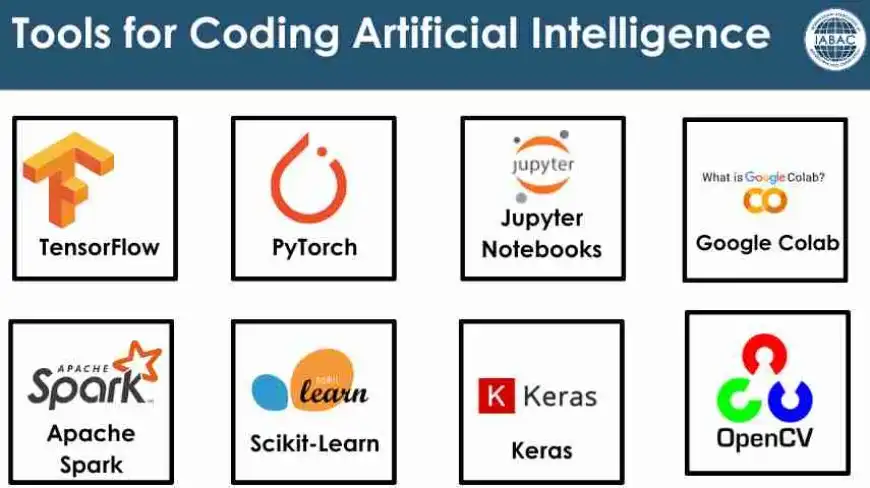In a world buzzing with data, machine learning (ML) is the secret sauce behind many tech breakthroughs and business wins. Whether you’re a pro data scientist or just dipping your toes into ML, the right tools can make your work easier, faster, and more impactful. Here’s a rundown of 15 fantastic ML tools that can level up your projects, written in a way that feels less like a textbook and more like a friendly chat.
1. TensorFlow
Think of TensorFlow as Google’s gift to the ML world. This open-source framework is a powerhouse for deep learning and all sorts of ML algorithms. It’s built to scale, so whether you’re deploying models on a server or a tiny edge device, TensorFlow has your back.
Why You’ll Love It:
- Handles distributed computing like a champ.
- TensorBoard makes visualizing your models a breeze.
- Huge community means you’re never alone when you’re stuck.
2. PyTorch
If you’re into research or love tinkering with code, PyTorch is your go-to. Its dynamic computational graphs make it super flexible, and it’s a favorite in academia because debugging is a walk in the park.
Why You’ll Love It:
- Change your model on the fly with dynamic graphs.
- GPU acceleration for lightning-fast performance.
- Tools like TorchServe make deployment a cinch.
3. Scikit-learn
Scikit-learn is like the Swiss Army knife of classical ML. Need regression, classification, or clustering? This Python library has you covered with simple, efficient tools that get the job done.
Why You’ll Love It:
- Amazing documentation that’s easy to follow.
- Tons of preprocessing tools to clean up your data.
- Plays nicely with other Python libraries.
4. Keras
Built on top of TensorFlow, Keras is like a friendly guide for building neural networks. It’s perfect for beginners or anyone who wants to prototype quickly without getting lost in the details.
Why You’ll Love It:
- Super user-friendly API.
- Modular design lets you experiment freely.
- Works seamlessly with TensorFlow.
5. Jupyter Notebooks
Jupyter Notebooks are like your personal ML playground. You can code, visualize data, and jot down notes all in one place. It’s a must-have for exploring data or teaching others.
Why You’ll Love It:
- Supports tons of programming languages.
- Add images, videos, or interactive widgets.
- Perfect for sharing your work with others.
6. Google Colab
Take Jupyter Notebooks, add free GPUs and TPUs, and host it in the cloud—that’s Google Colab. It’s a game-changer for anyone who wants to experiment without needing a fancy computer.
Why You’ll Love It:
- Free access to powerful GPUs and TPUs.
- Share your work easily with teammates.
- Syncs with Google Drive for hassle-free storage.
7. Apache Spark
Got big data? Apache Spark is your best friend. Its MLlib library lets you run machine learning on massive datasets across distributed systems without breaking a sweat.
Why You’ll Love It:
- Handles huge datasets with ease.
- Lightning-fast thanks to in-memory computing.
- Works great with Hadoop.
8. H2O.ai
H2O.ai is an open-source platform that’s all about speed and scale. Its AutoML feature is a lifesaver if you want to build models without spending hours tweaking them.
Why You’ll Love It:
- AutoML automates the boring stuff.
- Works with Python, R, and Java.
- Scales up for big data projects.
9. RapidMiner
RapidMiner makes ML accessible to everyone, even if you’re not a coding wizard. Its drag-and-drop interface simplifies everything from data prep to model deployment.
Why You’ll Love It:
- Visual interface means less coding.
- Tons of prebuilt templates to get you started.
- Connects to all sorts of data sources.
10. MATLAB
MATLAB is a favorite for engineers and researchers who love math-heavy projects. Its ML toolbox is packed with tools for preprocessing, training, and visualizing models.
Why You’ll Love It:
- Killer math and stats functions.
- Interactive visuals make data come alive.
- Great for signal processing and control systems.
11. Amazon SageMaker
Amazon SageMaker is like an all-in-one ML workshop. It handles everything from building to deploying models, all within the AWS ecosystem, with minimal setup.
Why You’ll Love It:
- Fully managed, so you focus on ML, not servers.
- Comes with prebuilt algorithms.
- Tightly integrated with AWS tools.
12. DataRobot
DataRobot is all about automating the ML process, so you can build accurate models fast. It’s a great pick for businesses that need enterprise-level solutions.
Why You’ll Love It:
- Automates feature engineering.
- Gives you deep insights into your models.
- Works in the cloud or on-premise.
13. Weka
Weka is a Java-based tool that’s perfect for beginners. It comes with a friendly interface and a ton of algorithms for analyzing data, making it great for learning or quick projects.
Why You’ll Love It:
- Easy-to-use graphical interface.
- Packed with built-in algorithms.
- Awesome for teaching or learning ML.
14. MLflow
MLflow keeps your ML projects organized. It helps you track experiments, package models, and deploy them, no matter what language or framework you’re using.
Why You’ll Love It:
- Tracks your experiments so you don’t lose ideas.
- Stores models in a central registry.
- Works with all the big ML libraries.
15. KNIME
KNIME is a low-code platform that lets you build data science workflows with a drag-and-drop interface. It’s versatile and plays well with other tech.
Why You’ll Love It:
- Build workflows without writing tons of code.
- Tons of plugins for extra functionality.
- Integrates with a wide range of tools.
The world of machine learning tools is always growing, with new features and updates making life easier for everyone. Whether you’re diving into deep learning or sticking with classic algorithms, these tools give you the power and flexibility to make your projects shine.








